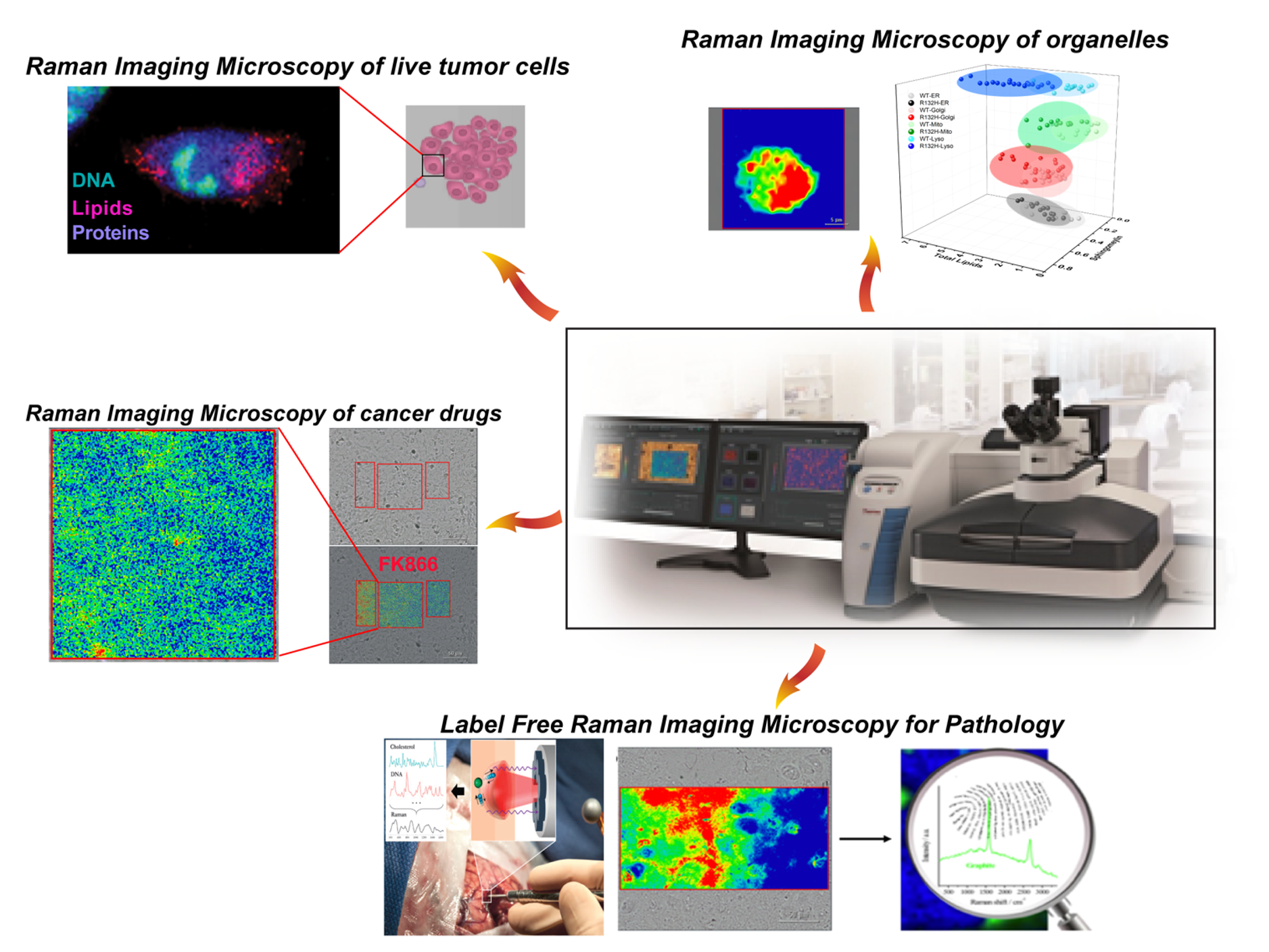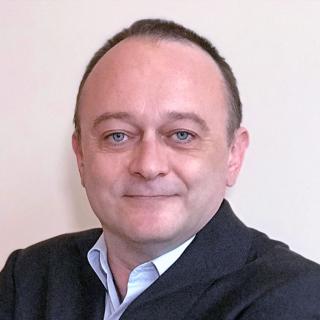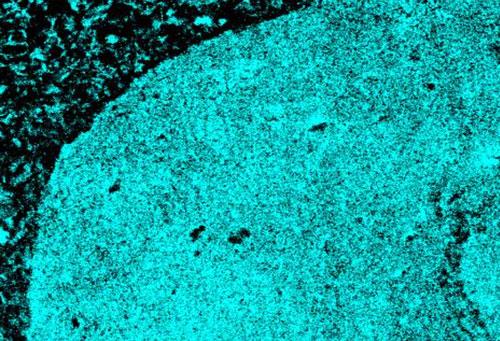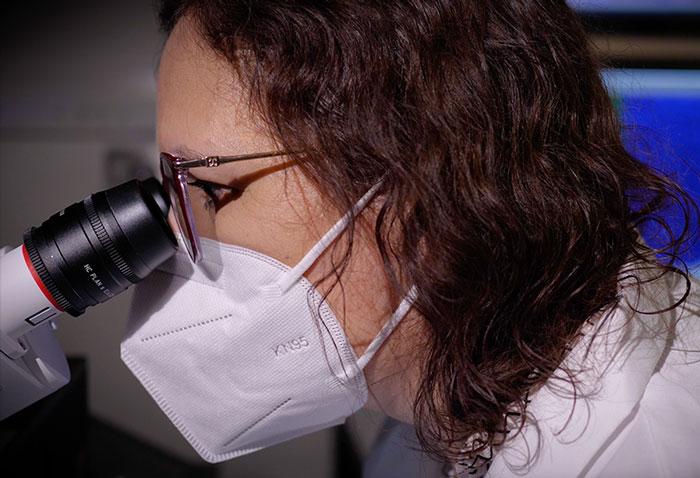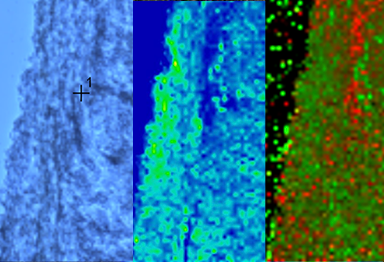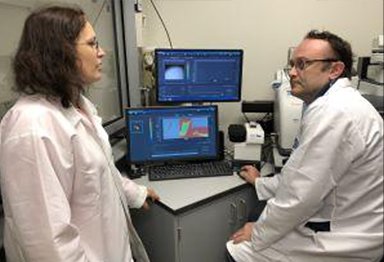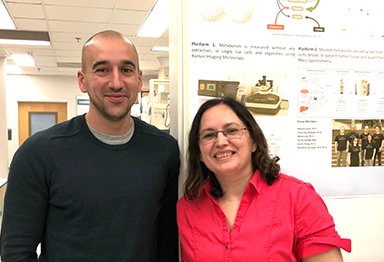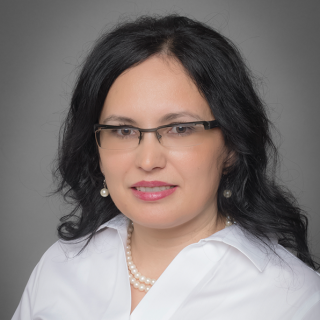
Mioara Larion, Ph.D.
- Center for Cancer Research
- National Cancer Institute
- Building 37, Room 1136A
- Bethesda, MD 20892
- 240-760-6825
- 240-541-4466
- mioara.larion@nih.gov
RESEARCH SUMMARY
Dr. Larion is a trained biochemist who leads the Cancer Metabolism Research Program at the Neuro-Oncology Branch (NOB). She is interested in the metabolic needs of cancer cells and how they process nutrients, in order to develop targeted approaches that delay tumor growth. She utilizes a set of technologies, including Raman imaging microscopy and metabolomics, to quantify patterns in proteins, lipids, and nucleic acids levels at subcellular resolution. This is a very important endeavor for glioma tumors, which are known to exhibit high heterogeneity.
Dr. Larion’s lab is specifically focused on identifying metabolic vulnerabilities in IDH1-mutated gliomas for clinical application, as well as developing technologies that enable these discoveries. Her lab has shown that lipid pathways are important for IDH1-mutant glioma growth, and that targeting specific enzymes from either fatty acid synthesis or sphingolipid pathway leads to specific cellular death in these cells. She is also interested in developing biomarkers to help image disease progression and monitor patients’ response to treatment.
Explore the NOB's Research Programs >
Areas of Expertise

Mioara Larion, Ph.D.
Research
As head of the the Cancer Metabolism Research Program at the Neuro-Oncology Branch (NOB), Dr. Larion observes the direct impact that cancer metabolism has on patient diagnosis, treatment, and outcomes. Because IDH mutations cause metabolic reprogramming, Dr. Larion’s research focuses on exploiting this phenomenon for therapeutic development and imaging studies that aid early diagnosis. Dr. Larion’s laboratory has shown that lipid pathways are important for IDH1-mutant glioma growth, and that targeting specific enzymes from either fatty acid synthesis or the sphingolipid pathway leads to specific cellular death in these cells (see figure).
Intracellular proteins, lipids, and nucleic acids can be quantified at the level of cells and individual organelles using Raman spectroscopy, which Dr. Larion leveraged for this project. Capturing changes in these molecules exposes the intrinsic vulnerabilities of IDH-mutant glioma cells. Studying this disease from various angles leads to better diagnostic, surgical, and therapeutic benefits for patients. Dr. Larion's research could also help create a “metabolomic map," outlining each patient's nutrient availability, mutational profile, and metabolic dependency.
Publications
- Bibliography Link
- View Dr. Larion's PubMed Summary
Advances in measuring cancer cell metabolism with subcellular resolution
IDH1 mutations induce organelle defects via dysregulated phospholipids.
Sphingolipid Pathway as a Source of Vulnerability in IDH1mut Glioma.
Metabolic Reprogramming Associated with Aggressiveness Occurs in the G-CIMP-High Molecular Subtypes of IDH1mut Lower Grade Gliomas
Toward Single-Organelle Lipidomics in Live Cells.
Biography
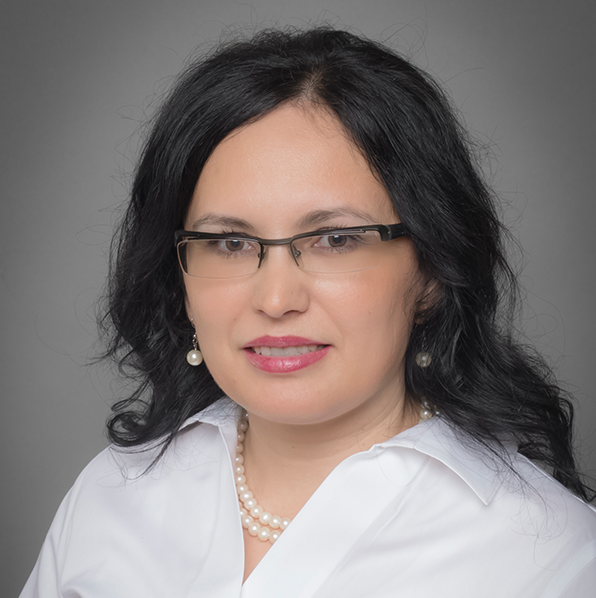
Mioara Larion, Ph.D.
Dr. Larion trained as a biochemist and biophysicist during her Bachelor of Science degree in Romania, and continued to study these same topics during her Master of Science degree and Ph.D. from Florida State University. In graduate school, her work involved biophysics and enzymology. During this time, she developed a passion for learning about how enzymes function, and how their dysfunction can cause or exacerbate certain diseases. Shortly thereafter, she joined the Neuro-Oncology Branch (NOB) as an investigator, and was introduced to the field of oncology. She now leads the NOB’s Cancer Metabolism Research Program.
In addition to her research, Dr. Larion is also involved in a number of committees. She served as the co-chair of the first NCI-SNO Joint Symposium on Targeting CNS Tumor Metabolism and co-leads the NOB’s Visiting Scholars Program. She has also participated in NIH Grant Review Panels for metabolomics-related research, and organized the Metabolomics Association of North America Conference.
Honors, Awards and Leadership
- Chair, NIH Cancer Metabolism Interest Group - 2021-present
- Member, Metabolomics Society “Precision Medicine Task Force” - 2018-present
- Co-Chair, Neuro-Oncology Branch Visiting Scholars Program - 2016-present
- Co-Chair, 1st NCI-SNO Symposium on Targeting CNS Tumor Metabolism - 2020
- Organizer, 1st Metabolomics Association of North America - 2019
- Performance Award - 2018-2020
- Member, NIH Review Panel for Metabolomics ZRG1 BST-X (50) - 2016
Select Societies and Initiatives
- American Association for Cancer Research (AACR)
- Society of Neuro-Oncology (SNO)
- The Biophysical Society
Job Vacancies
We have no open positions in our group at this time, please check back later.
To see all available positions at CCR, take a look at our Careers page. You can also subscribe to receive CCR's latest job and training opportunities in your inbox.
Team
News
Researchers Use Artificial Intelligence to Tease Apart Subtypes of Glioma
June 26, 2024
A new machine learning model sifts through data derived from brain tumor tissue to reveal a wealth of information and help identify the tumor subtype. Read More >
Understanding How Cell Metabolism Fuels Brain Tumors
August 1, 2023
Dr. Mioara Larion aims to develop better, less toxic treatments for people with brain and spine tumors by understanding the set of life-sustaining chemical reactions broadly known as metabolism. Watch video >
Building a Toolkit to Examine How Cancer Cells Redirect Their Energy
November 28, 2022
A technique called Raman spectroscopy has revolutionized the way Dr. Mioara Larion’s lab understands tumor cell metabolism—and may ultimately help researchers design more effective cancer drugs. Read more >
March 25, 2021
How can we be innovative in our approach to research in order to improve outcomes for central nervous system tumors? That is the driving question behind Dr. Larion's Cancer Metabolism Research Program. Read more >
Celebrating National Mentoring Month
January 31, 2020
We celebrate our impactful mentors in the Neuro-Oncology Branch for National Mentoring Month. Our postdoctoral fellows share their love for science and how their mentors have made their experience at NIH more rewarding. Read more >
